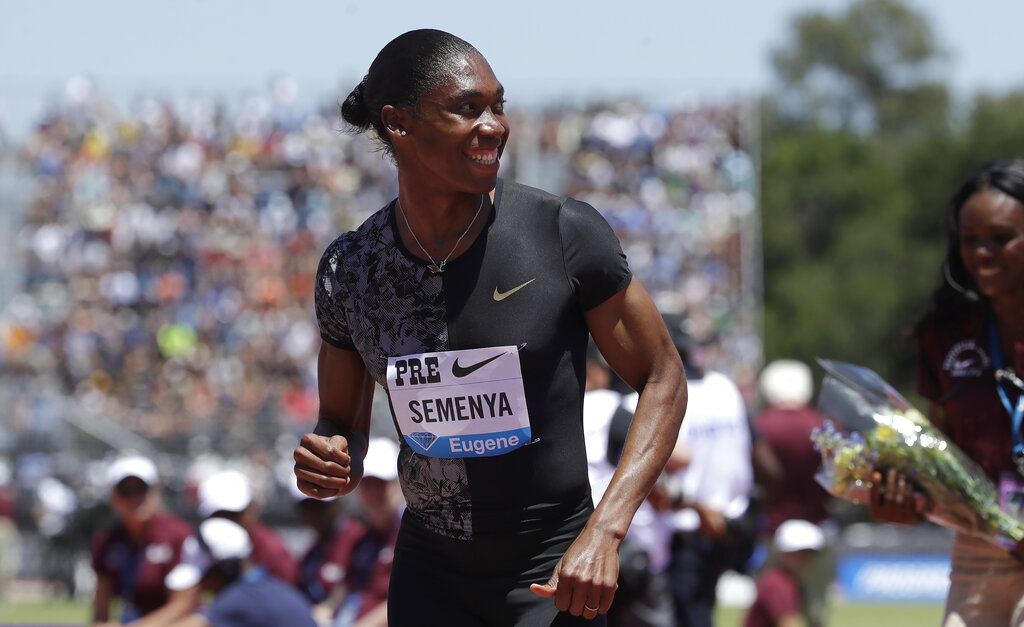Track star Caster Semenya signs for South African football team

FILE – In this Sunday, June 30, 2019 file photo, South Africa’s Caster Semenya smiles after winning the women’s 800-meter race during the Prefontaine Classic, an IAAF Diamond League athletics meeting, in Stanford, Calif.. Caster Semenya has signed for a South African soccer club and may be considering giving up track and field. The Olympic 800-meter champion, who is currently in a legal battle with the IAAF over her right to compete without taking testosterone-suppressing medication, said she has joined women’s club JVW FC. (AP Photo/Jeff Chiu, File)
Caster Semenya has signed to play with a South African football
team, a strong hint that the two-time Olympic 800-meter champion might be ready to give up track and field after a decade-long legal battle with the IAAF.
Semenya wrote on Twitter on Friday that she had joined Johannesburg-based women’s club JVW FC and said she was looking forward to a “new journey.”
The club said Semenya began training with the team this week but will only play league matches next year because the window to sign new players for this season is closed. Next year’s Tokyo Olympics are in July and August, when the women’s soccer season will be in action.
Semenya didn’t directly say if she was retiring from track and field.
“I am grateful for this opportunity and I appreciate the love and support I already get from the team,” Semenya said. “I am looking forward to this new journey, and hopefully I can contribute as much as I can to the club.”
JVW FC is owned by South Africa national women’s team captain Janine van Wyk, a former Houston Dash defender.
“I am extremely elated to have such an iconic athlete join my football club,” van Wyk said. “I am absolutely honored that out of all the other women’s clubs around the world, she (Semenya) has chosen JVW as the club where she would like to start showcasing her football skills.”
Semenya is barred from defending her 800 title at this month’s world championships — and cannot compete in any top-level events in races from 400 meters to one mile — after refusing to follow IAAF rules requiring her to reduce her natural testosterone to compete. She is appealing against those rules at the Swiss supreme court but faced a setback in July when the court provisionally upheld the rules, ending her ambitions to defend her title at the worlds in Doha, Qatar.
The Swiss supreme court hasn’t yet announced a final verdict in Semenya’s appeal but she appears to be thinking about life after track.
Semenya has often posted messages on social media in the past few months hinting she would walk away from track and field if she wasn’t allowed to run without taking hormone-suppressing medication.
In the hours after the Swiss supreme court upheld the IAAF regulations in that temporary ruling in July, Semenya wrote on Twitter: “First chapter of my life done, looking forward to my second chapter.”
The 28-year-old Semenya is one of several elite female athletes with one of a number of conditions known as differences of sex development, which result in male and female biological characteristics. She was legally identified as female at birth and has identified as female her whole life but was born with the typical male XY chromosome pattern and has testosterone levels higher than the typical female range. The IAAF says that testosterone gives her an unfair athletic advantage over other female runners and she must medically reduce it to be allowed to compete.
The IAAF has argued that athletes with her condition are “biologically male,” an assertion that Semenya calls “deeply hurtful.”
Semenya is fighting for the testosterone regulations to be thrown out but lost her case at the Swiss-based Court of Arbitration for Sport earlier this year, prompting her to appeal to Switzerland’s supreme court.